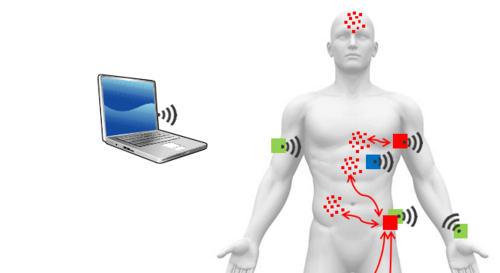Simulationframework

While research and development in the field of sensor networks and body area networks has become increasingly mature in recent years, networks of nanodevices (nanoscale devices) in the body represent a new and fascinating research direction. The vision of these networks is that nanodevices are patrolling the body to make measurements wherever necessary and send the collected data to the outside. These machines could even directly solve problems that they find in the body, such as eliminate cancer cells, arteriosclerosis or HI viruses.
Research on intra-body networks is still in its infancy, yet a number of concepts have been explored, e.g. how the communication in the body could be realized. Even though these concepts could not yet be implemented in experiments or applications in the real world, it makes sense to extend research to other topics. The basic nanoscale communication technologies, as well as other aspects such as higher-layer protocols, or as algorithmic issues and applications are of major interest. From a computer science point of view, the investigation of new concepts is best done in the context of simulations.
There are already some simulators that can handle protocols and algorithms at the nano level. In order to meaningfully simulate the communication between nanorobots or nanorobots with external devices, the environment is of great importance. This conclusion can be transferred from transport networks where it has been shown that the performance of network protocols and algorithms varies greatly due to the influence of the test environment. Medical nanorobots will most likely move almost permanently in the bloodstream. The resulting influences on the position and communication of the nanobot can only be simulated holistically if the test environment is included.
Based on the established network simulator ns-3, this project develops a simulation framework that integrates these aspects into its model.
Project Members
Marc Stelzner, M. Sc.

Institut für Telematik (ITM)
+49 451 3101 6431
stelzner(at)itm.uni-luebeck.de
Immo Traupe, M. Sc.

Institut für Telematik (ITM)
Regine Wendt (geb. Geyer), M. Sc.

Institut für Telematik (ITM)
+49 451 3101 6414
wendt(at)itm.uni-luebeck.de
Project Manager
Stefan Fischer

Institut für Telematik (ITM)
+49 451 3101 6400
fischer(at)itm.uni-luebeck.de


![[Translate to english:] Link COPICOH [Translate to english:] Link COPICOH](/fileadmin/_processed_/9/1/csm_LI-In-Bug_8ed46db0dc.png)
![[Translate to english:] Link COPICOH [Translate to english:] Link COPICOH](/fileadmin/_processed_/1/b/csm_vimeo_icon_white_on_blue_rounded_b79e632cf7.png)